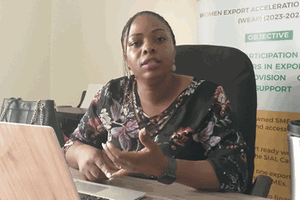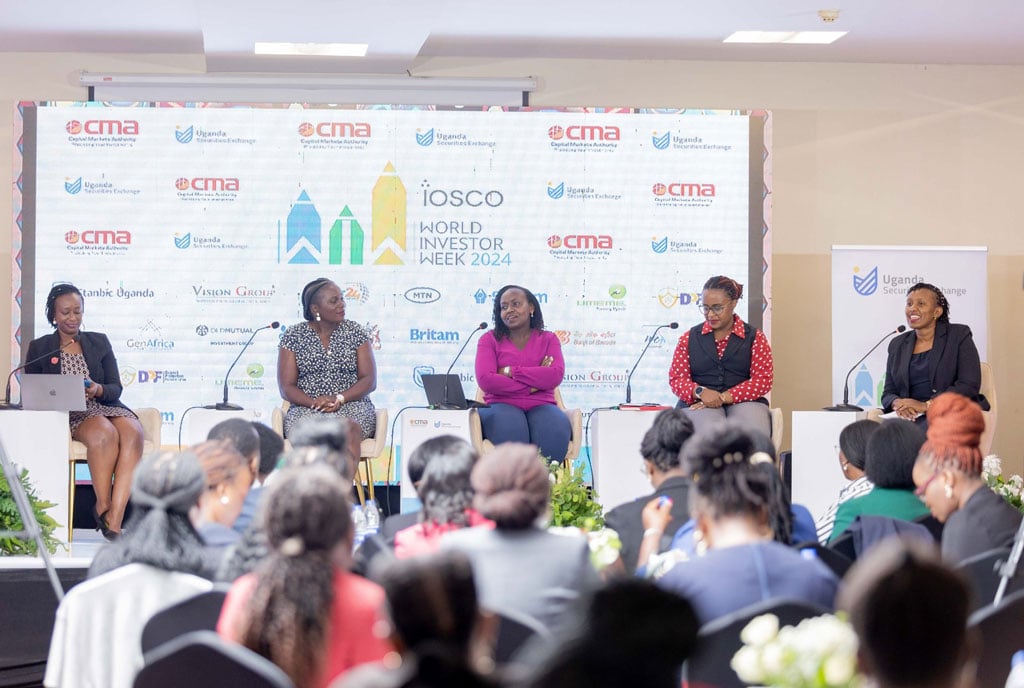
Money in a banking hall. The Grow project has been introduced to provide financial support with loans ranging from Shs4 million to Shs200 million. PHOTO/FILE
In August, women from as far as Jinja and Mityana districts, gathered at Hotel Africana for a knowledge-sharing day-long seminar for the Generating Growth Opportunities and Productivity for Women Enterprises (GROW) grant.
Vice President Jessica Alupo subsequently launched the project from the World Bank, which is worth $217m (Shs806b). Later, women started the search for support from the GROW project, but many faced the harsh reality that not all of them qualified for the funding they had hoped for.
Uganda leads Africa in female entrepreneurship, with one of the highest proportions of women business owners globally. According to the 2021 Mastercard Index of Women Entrepreneurs, Uganda was ranked among the top countries with the highest percentage of women starting or owning businesses, highlighting its supportive entrepreneurial environment and a cultural norm of women engaging in business activities to support their families and communities. Despite this, women entrepreneurs face major challenges, particularly in access and cost of finance, which remains a key constraint among women who operate informal businesses.
Similar to initiatives like Emyooga and Parish Development Model, the GROW project seeks to meet financial and developmental needs, by enabling women to tap into the $50m (Shs185b) loan fund, through which participating banks provide loans specifically for women-led enterprises, ranging from Shs4m to Shs200m.
The project categorises the business loans into microcredit, ranging between Shs4m and Shs20m, small scale credit, between Shs20m and Shs40m and medium credit between Shs40m and Shs200m, all of which are payable within 24 months.
However, weeks after the launch, complaints started filtering through social and mainstream media, especially from micro business owners, many of whom claimed banks were making it hard for them to access the money.
This prompted the Speaker of Parliament to demand a report on the progress and guidelines of the project, after some Members of Parliament (MPs) such as Christine Kaaya, the Kiboga District Woman MP, argued that whereas consideration should be given to new businesses, the current requirements lock them out.
Jackline Arinda, an entrepreneur and founder of Jada Coffee, questioned what type of woman the GROW project was targeting, noting: “At first, they made it look like the money was for both micro and medium enterprises. So, when I went to my bank, they told me that unless I needed Shs5m, I would need collateral”.
“I expected them to understand that micro businesses can’t have that kind of collateral. If you’re a micro business, you can’t be buying assets to grow your business, and I didn’t expect that requirement for the micro businesses they claim to be targeting,” she added.
But Steven Asiimwe, the Private Sector Foundation Uganda executive director, says there are some guidelines that are followed to the last chain of dispensing money to applicants.
“We wanted to empower small women entrepreneurs and bring them into the formal economy. If I am to borrow from a commercial bank, my business must be registered, and there must be traceability,” he says.
The loans carry an interest of 10.5 percent, which comes down to an average of 0.8 percent per month, which is way lower than the market average of 2 percent per month.
Asiimwe also notes that the guidelines provide that the loans must be advanced against a security such as a land title or movable assets such as a car or machinery, which in the unlikely event of failure to pay, gives an assurance that the money is recoverable.
“For those saying there are stringent mechanisms and that it is hard to access the money, let me challenge that analogy. So far, more than 1,110 women have benefitted from the money they were given. So, why is demand greater than supply? It means that women who were ready have taken the money. The faster you can provide collateral that is traceable and legitimate, the faster you get the money,” he says.
Progress of project
David Kibenge, the permanent secretary in the Ministry of Gender, says the agreements signed with the initial commercial banks are valued at Shs98.55b, of which more than 1,100 women had benefited, demonstrating the programme’s potential despite initial challenges.
At least, Shs26b was advanced to the participating financial institutions in August 2024, while as of September, Shs18.98b had been lent out to 1,193 women entrepreneurs.
Centenary Bank and Finance Trust Bank exhausted Shs6b each released in the first tranche.

A lady makes clothes at the Uganda Industrial Research Institute in Namanve, Mukono District. PHOTO/MICHAEL KAKUMIRIZI
To ensure that the project is not abused, government contracted KPMG to undertake due diligence and verify loans given to participating financial institutions before release of additional funds. In this regard, KPMG has finalised the verification exercise that will lead to release of another tranche to banks whose allocations have been exhausted.
Kibenge further says that under the GROW programme, financial institutions bear all risks, including absorbing any losses in the event of default.
Furtherstill, he says, women entrepreneurs who will pay back their loans as scheduled, halfway through their loan period, will receive a grant of their loan value by 5 percent.
Thus, the provision of security by those intending to borrow should not be seen as a limiting factor but rather a demonstration of commitment to repay the loan.
Knowing that many women may not possess registered land, there were negotiations with the participating commercial banks to broaden the securities accepted to include basic forms of security from unregistered land, movable household items, and business assets.
Loan sustainability
Financial institutions take responsibility for assessing creditworthiness and lending to only those who are assessed to be able to repay based on the financial institutions’ credit assessment protocols and regulations.
The GROW project will run until December 2027, providing an opportunity for women-owned businesses to access financial support and grow their enterprises.






